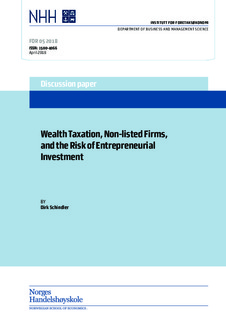Wealth Taxation, Non-listed Firms, and the Risk of Entrepreneurial Investment
Working paper

Åpne
Permanent lenke
http://hdl.handle.net/11250/2496488Utgivelsesdato
2018-04-27Metadata
Vis full innførselSamlinger
- Discussion papers (FOR) [566]
Sammendrag
How to incorporate hard-to-value assets into the wealth tax? We analyze the effect of an optimal wealth tax on risk-taking behavior and welfare when investors do not only have the standard portfolio choice with a well-diversified market portfolio, but can alternatively choose to invest all their wealth into a non-diversifiable, indivisible project. The latter is interpreted as entrepreneurial investment into a small, nonlisted firm for which the actual value is hard to measure and non-verifiable. For such firms, real-world wealth tax systems base the wealth tax on deterministic book values. We show that this tax treatment does not distort the choice of projects if the tax is set optimally with an imputed interest rate on book values, actually larger than the risk-free market rate of return. The market equilibrium and a proportional tax on the market portfolio will ensure an efficient risk allocation between private and public consumption and across projects. Failing to apply an imputed inflation of book values, instead, gives rise to an implicit subsidy on entrepreneurial activity and distorts investment. Our findings also have implications for taxation of hard-to-value assets under capital-gains and inheritance taxation.